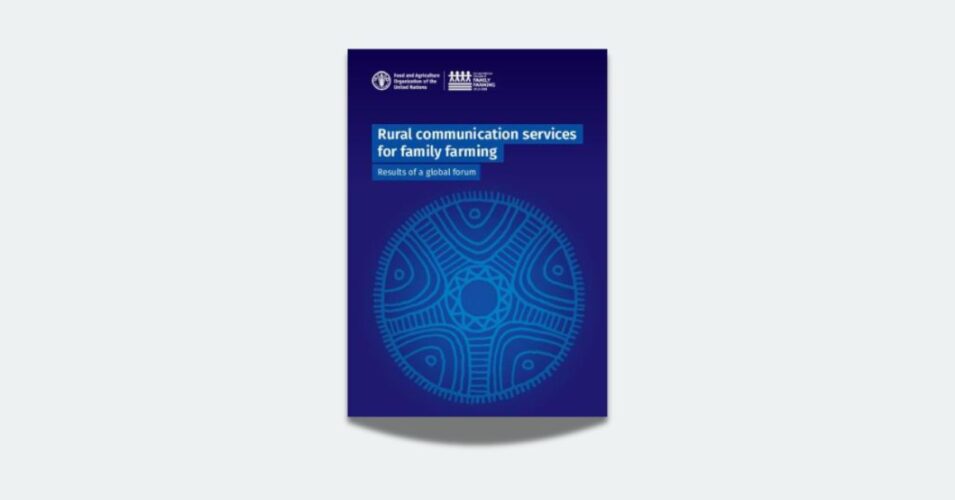Family farmers are essential to sustainable agriculture and food production in many rural regions of the world. However, they frequently do not have access to timely, accurate, and localized information, even though they play a crucial role in feeding communities. Their capacity to enhance livelihoods, adjust to climate change, and engage in policymaking is hampered by this communication gap. Addressing this, the Food and Agriculture Organization of the United Nations (FAO) carried out a comprehensive consultative process with regional and international partners, which resulted in the publication of the report “Rural Communication Services for Family Farming – Results of a Global Forum” in 2024. More than 90 people from Africa, Asia, and Latin America attended the July 2022 forum to exchange ideas, experiences, and suggestions for enhancing rural communication services (RCS).
According to the report, empowering farmers requires RCS, which are defined as inclusive, two-way, sustained communication processes that are adapted to rural needs. Communication is still inconsistent across regions. Who has access to information depends on a number of factors, including geography, socioeconomic status, age, and gender. Despite rising internet and mobile phone usage, rural areas continue to suffer from poor infrastructure and restricted media reach, and women and young people are still excluded from the digital world. On the other hand, community-based communication models are working well. The MVIWATA FM radio station in Tanzania gives farmers the ability to host shows, select discussion topics, and sway policymakers. Through the use of culturally appropriate communication tools, SEWA works with 2.5 million women in India to enhance market access and agricultural practices. In Mexico, Redes A.C. encourages local media networks that strengthen youth empowerment and community identity.
The fact that policy support is changing is among the most important conclusions. Even though a number of nations have started incorporating ICTs into their development plans, many of the current regulations are still top-down and do not take family farmers’ needs into account. There is a growing movement to use rights-based and participatory approaches to mainstream communication into agricultural policies.
To map current RCS efforts, identify gaps, and promote inclusive frameworks, regional initiatives like ComDev Asia, Yenkasa Africa, and Onda Rural have been crucial. Additionally, these platforms have made it easier to establish communities of practice and offered technical assistance for creating communication plans that are part of national action plans (NAPs).
The forum came to the conclusion that institutional cooperation, political will, and strategic investment are necessary to advance RCS. To increase access, governments must establish supportive legal frameworks, encourage community media, and provide funding for infrastructure. Building capacity is just as crucial. Farmers, particularly women and young people, need to be able to use digital tools and actively engage in policy discussions. To scale up successful models and inform future planning, it is essential to generate evidence and document local RCS experiences.
The FAO and its partners provide a clear road map for incorporating RCS into national and international policies by placing communication at the center of rural development. In addition to giving family farmers a stronger voice, this will help the UN Decade of Family Farming achieve its objectives and create resilient, inclusive food systems for all.
To learn more about this publication, visit Rural communication services for family farming: Results of a global forum by FAO.
SOURCE:
Fao. (2024). Rural communication services for family farming. https://openknowledge.fao.org/items/5e10a383-62b4-41cb-9f7e-2c0a12965846?fbclid=IwY2xjawL-LIhleHRuA2FlbQIxMABicmlkETFndHA4NW9MZHE5RjM1ZTdpAR6Hr4gOR0ekHf7rEvCY9xCMv3sfcYZ64Mhfom7D4Qf7BER8krRS9EyH9DLWzQ_aem_l1XF5-YkMPrekuwuohKbeA\
Article contributed by Jemvy Grace Sedano, ComDev Asia intern


Comments are closed, but trackbacks and pingbacks are open.